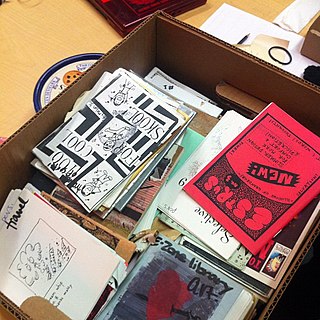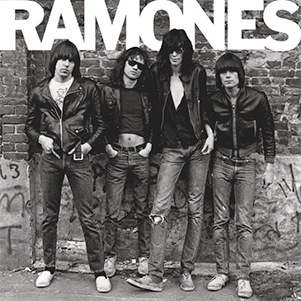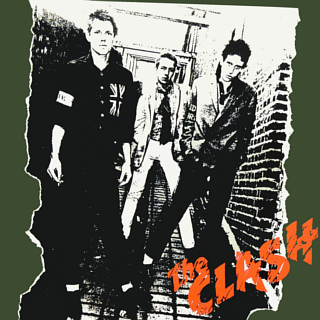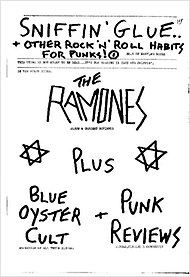A fanzine is a non-professional and non-official publication produced by enthusiasts of a particular cultural phenomenon for the pleasure of others who share their interest. The term was coined in an October 1940 science fiction fanzine by Russ Chauvenet and first popularized within science fiction fandom, and from there the term was adopted by other communities.
Punk rock is a music genre that emerged in the mid-1970s. Rooted in 1960s garage rock, punk bands rejected the perceived excesses of mainstream 1970s rock music. They typically produced short, fast-paced songs with hard-edged melodies and singing styles, stripped-down instrumentation, and often shouted political, anti-establishment lyrics. Punk embraces a DIY ethic; many bands self-produce recordings and distribute them through independent record labels.

The punk subculture includes a diverse and widely known array of ideologies, fashion, and other forms of expression, visual art, dance, literature, and film. Largely characterised by anti-establishment views, the promotion of individual freedom, and the DIY ethics, the culture originated from punk rock.

The Clash were an English rock band formed in London in 1976 who were key players in the original wave of British punk rock. Billed as "The Only Band That Matters", they also contributed to the post-punk and new wave movements that emerged in the wake of punk and employed elements of a variety of genres including reggae, dub, funk, ska, and rockabilly. For most of their recording career, the Clash consisted of lead vocalist and rhythm guitarist Joe Strummer, lead guitarist and vocalist Mick Jones, bassist Paul Simonon, and drummer Nicky "Topper" Headon.

A zine is a small-circulation self-published work of original or appropriated texts and images, usually reproduced via a copy machine. Zines are the product of either a single person or of a very small group, and are popularly photocopied into physical prints for circulation. A fanzine is a non-professional and non-official publication produced by enthusiasts of a particular cultural phenomenon for the pleasure of others who share their interest. The term was coined in an October 1940 science fiction fanzine by Russ Chauvenet and popularized within science fiction fandom, entering the Oxford English Dictionary in 1949.
Pub rock is a subgenre of rock music that emerged in the early to mid-1970s in the United Kingdom. A back-to-basics movement, which incorporated roots rock, pub rock was a reaction against the expensively-recorded and produced progressive rock and flashy glam rock scenes at the time. Although short-lived, pub rock was played live in small traditional venues like pubs and clubs. Since major labels showed no interest in pub rock groups, pub bands sought out independent record labels such as Stiff Records. Indie labels used relatively inexpensive recording processes, so they had a much lower break-even point for a record than a major label.

Ramones is the debut studio album by American punk rock band the Ramones, released on April 23, 1976, by Sire Records. After Hit Parader editor Lisa Robinson saw the band at a gig in New York City, she wrote about them in an article and contacted Danny Fields, insisting that he be their manager. Fields agreed and convinced Craig Leon to produce Ramones, and the band recorded a demo for prospective record labels. Leon persuaded Sire president Seymour Stein to listen to the band perform, and he later offered the band a recording contract. The Ramones began recording in January 1976, needing only seven days and $6,400 to record the album.

Alternative TV are an English band formed in London in 1977. Author Steve Taylor writes: "Alternative TV pioneered reggae rhythms in punk and then moved on to redefine the musical rules".

A punk zine is a zine related to the punk subculture and hardcore punk music genre. Often primitively or casually produced, they feature punk literature, such as social commentary, punk poetry, news, gossip, music reviews and articles about punk rock bands or regional punk scenes.

The Clash is the debut studio album by English punk rock band, The Clash. It was released on 8 April 1977 through CBS Records. Recorded and mixed over three weeks in February 1977 for £4,000, it would go on to reach No. 12 on the UK charts, and has been included on many retrospective rankings as one of the greatest punk albums of all time.

Leave Home is the second studio album by American punk rock band the Ramones. It was released on January 10, 1977, through Sire Records, with the expanded CD being released through Rhino Entertainment on June 19, 2001. Songs on the album were written immediately after the band's first album's writing process, which demonstrated the band's progression. The album had a higher production value than their debut Ramones and featured faster tempos. The front photo was taken by Moshe Brakha and the back cover, which would become the band's logo, was designed by Arturo Vega. The album spawned three singles, but only one succeeded in charting. It was also promoted with several tour dates in the United States and Europe.

Mark Perry is a British writer and musician, and former fanzine publisher.
Miles Axe Copeland III is an American music and entertainment executive and former manager of The Police. Copeland later managed Sting's musical and acting career. In 1979, Copeland founded the I.R.S. Records label, producing R.E.M., The Bangles, Berlin, The Cramps, Dead Kennedys, The Alarm, The Go-Go's, and others.
The mod revival was a subculture that started in the United Kingdom in the late 1970s and later spread to other countries. The mod revival's mainstream popularity was relatively short, although its influence lasted for decades. The mod revival post-dated a Teddy Boy revival, and mod revivalists sometimes clashed with Teddy Boy revivalists, skinhead revivalists, casuals, punks and rival gang members.

"Sheena Is a Punk Rocker" is a song by American punk rock band Ramones, released in 1977 through Sire Records. Written by front man and lead vocalist Joey Ramone it appears on the band's third studio album Rocket to Russia (1977). The song is well known for its early 1960s influence of surf rock and bubblegum pop that influenced Joey; it has since remained one of the band's most popular songs.
Brisbane punk rock had its main impact between 1975 and 1984 as part of the overall punk rock scene in Australia. According to rock music historian, Ian McFarlane, the Queensland capital provided "some of the most anarchistic bands" of that era whilst it was "arguably the most conservative city" in the country. The development of the local punk movement differed from other cities because of its relative geographic isolation from other similar trends. The Brisbane scene also received a greater scrutiny by local police where early punk bands formed as "an obvious backlash to an oppressed society". This generated antagonistic and individualistic groups or "snot" driven punk bands.
Gary Pig Gold is a Canadian singer-songwriter, record producer, filmmaker, author and journalist. His fanzine The Pig Paper was Canada's second independently published music magazine, and among the recording artists he has worked with are Pat Boone, Dave Rave, Endless Summer, Simply Saucer and Shane Faubert. Gold has written many books on popular music and has contributed to dozens of magazines as well as seven books in the multi-genre MusicHound album guide series. AllMusic describes him as "rock music's all-time hardest-working man ... with all apologies to James Brown".
"Garageland" is a song by English punk rock band The Clash featured as the final track for their 1977 debut album The Clash.
Gavin Martin was a globally celebrated Northern Irish music journalist.
Dutch punk, or Nederpunk, is a body of music that evolved in the Netherlands that encompasses the various styles of punk rock music. The culture surrounding punk rock is often strongly politically oriented; in the Netherlands, punk culture grew alongside, and was influenced by, the Dutch squatters' movement and other European squatters' movements. Few Dutch punk bands write lyrics in Dutch. However, as a small country, punk in the Netherlands has evolved with a unique mix of UK, US, European, and global punk influences.









